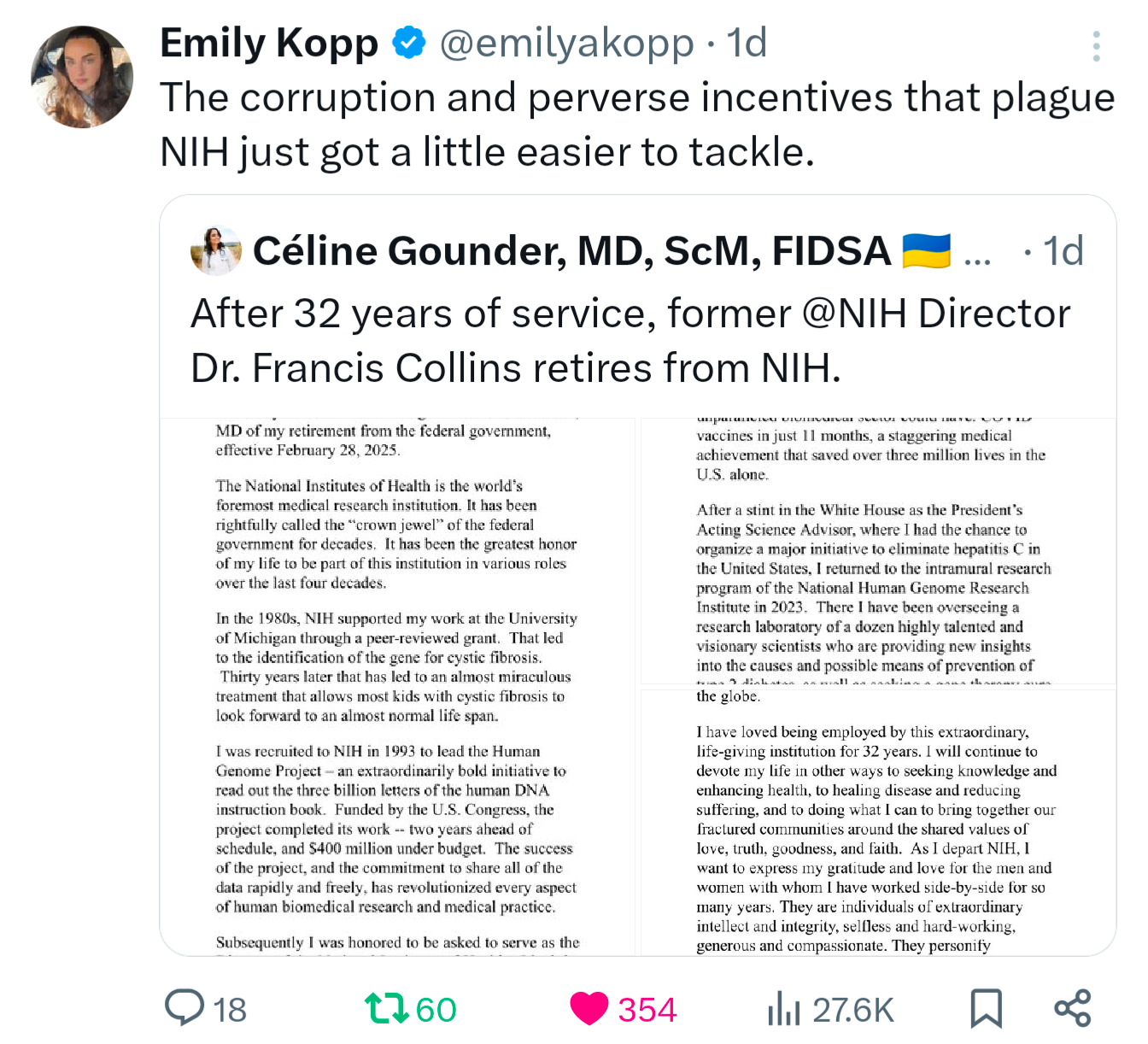Francis Collins retires from the NIH
He sequenced CFTR but funded GOF research, you win some, you lose some...
Francis Collins has retired from the NIH. He was an MD PhD who did important things in genetics. He helped sequence the cystic fibrosis gene. To my knowledge he did not practice clinical medicine. Then, about a decade ago, he voiced support for gain of function research. The NIH, under his leadership, funded the Wuhan lab. After the virus exploded globally, Collins orchestrated a media campaign to discredit future NIH director Jay Bhattacharya and he suppressed debate on whether lockdown or school closure should continue. During the peak pandemic, he wrote parody songs about the virus to the tune of Puff the Magic dragon. He was, like so many in science, someone who does something good once upon a time in the lab, but then runs a large policy program that he had no training for.
His scorecard
+1,000,000 lives saved from his genetics work. And hundreds of millions in economic productivity!
But then discounted by
-20,000,000 dead from coronavirus and -20 trillion in losses
Net
-19,000,000 lives
-19.999 trillion in losses
Also because he tried to silence the GBD authors and because he supported vaccine and mask mandates a couple more negatives
- loss of trust in vaccination
-loss of trust in science
About twenty years ago, Francis wrote an essay in NEJM. He said that by the year 2015, we would sequence patients to decide what antihypertensives they would take. That never materialized. Although, genomics did help, particularly rare diseases, it has nearly no impact on the main, multifactorial killers in America like obesity, high blood pressure and heart disease.
Finally. Francis Collins never once tried to see if the way the NIH gives out grant money is optimal he ran precisely zero studies on the topic. This was unfortunate.
Here is a few more thoughts on his service
Remember to subscribe to support this stack







Dr. Collins launched the Human Genome Project at the NIH the year after I began my faculty appointment. At the time, the belief was that so much would be learned from sequencing the human genome that many diseases would be cured, or their management be greatly improved. It was supposed to be a game changer.
The genome was sequenced but the promise that it would change the very nature of treating human disease never materialized. As it turned out, things were far more complicated than was imagined. Changes in genes could be made in various animal models and nothing happened. Few genes are so important that changing their function has a major phenotypic effect.
Nevertheless, Dr. Collins was a superstar and given control of the NIH. Being a basic scientist, he converted the NIH into a massive basic science (mostly molecular biology) shop. Clinicians and clinical experience were downgraded to the point, that in one of my last unfunded grant applications, I was referred to by an NIH study section as "just a clinician.'
Consequently, the NIH does little to support the actual practice of medicine. You can tell this by looking at clinical practice guidelines and see how many recommendations are supported by high quality (i.e., level 1 evidence). Most of what we do in clinical care is based on less than compelling research. As an exercise, I'd suggest clinicians think about something they do clinically and how NIH funding contributed to a therapeutic approach that is used.
In my field of surgery, its almost nothing. Appendectomy? One major trial funded by PCORI that confirmed what was found several years before in Finland. Hernia? I con’t think of a single NIH funded RCT that drives decision making. Cholecystitis? It’s been years since the NIH funded much research into this disease. Certainly no much we do when treating is dictated by NIH funded research. Small Bowel Obstruction-Nothing funded that I know of. The list goes on…
I used to edit a geriatric section at JAMA. It was common that when we asked authors to cite evidence supporting treatment recommendation, none existed. And geriatrics consumes most of our health care spend.
Like Vinay said, Collins had his day and made impressive discoveries. But then he was allowed to dictate the emphasis of nearly all medical research for a very long time and, in my opinion, led the NIH away from what it needed to do.
be made in various animal models and nothing happened. Few genes are so important that changing their function has a phenotypic effect.
Thank goodness! And not a moment too soon, since Dr. Bhattacharya will be confirmed in a few days. Will he go to work for a pharmaceutical company?
Thanks, Vinay, for the article. I’m not hopeful that he will face any consequences for his behavior from this administration, unfortunately, and I would love to be wrong.
Yes that Puff the Magic Dragon parody was so awful and illustrative of his feelings toward the public. It made me sick to my stomach to watch it. He appears to be one of those government bureaucrats who thinks we the people are stupid, and cannot think critically or logically about anything related to science. Good riddance!